A free, accessible education is central to our nation’s success. But right now, we see concerted efforts to challenge what is taught in schools and how it is taught. Efforts to protect and strengthen our education system are more critical now than ever, and events like SXSWEdu encourage the thinking necessary to fuel these vital efforts.
SXSWEdu is a dynamic event that brings together educators, activists, policymakers, parents, and students to discuss complex issues in education and explore solutions to create inclusive spaces for students and lifelong learners. At the forefront of these conversations are issues that deeply impact all of us, including legislation that stifles how educators talk about race, gender, and identity and prevents schools from fostering enriching, fact-based and age-appropriate discussions in their classrooms.
In her keynote speech, Kimberlé Crenshaw, co-founder and executive director of The African American Policy Forum and a pioneering scholar whose work has been foundational in critical race theory and intersectionality, reminded us that: “It is not an accident that when we’re rolling back and moving away from the societal consensus about what’s necessary to create full and inclusive citizenship, one of the first things to go is full and inclusive education.”
At Fenton, we defend education and diversity by dismantling barriers challenging safe and inclusive schools. Here are three key takeaways from my SXSWEdu experience that resonated for me:
1. We cannot do the work of the right and censor ourselves: Right now, 28 states have passed legislation that limits the ways race, gender, and identity can be taught in schools, impacting millions of students. These bills have cast a chilling effect across public schools by creating conditions of self-censorship. In the session Mapping the Assault on Critical Race Theory, Jeremy Young, program director at PEN America, noted that these restrictive bills are intentionally vague to intimidate educators and administrators to distance themselves from what is essential for students to learn out of fear to avoid discipline or criminal liability.
Crenshaw noted one example of self-censorship in her keynote speech: the Supreme Court’s decision on race-conscious admissions policies in two universities. After the decision was passed, institutions nationwide began removing diversity from their organizational mission and limiting racially inclusive recruiting practices. By doing this, these institutions were doing the work the “anti-woke” movements wanted them to do. However, throughout history, we have seen that practices aimed at advancing diversity, equity and inclusion were not embraced with the same urgency. When Brown V. The Board of Education was decided – 70 years ago – there was massive opposition to integrating schools. Crenshaw said, “We need to have more of a spirit of resistance against the backward turn in American society. We need to fight like our lives depend on it because they do.”
2. Civic education is crucial for education and democracy: One way to center young people in the decisions that impact their lives and enable them to participate in the fight for an inclusive and multiracial society is through civic education. It allows students to connect the dots between the issues they care about and make informed decisions to take action for themselves and their communities. In a session titled The Future of Democracy Starts in the Classroom, Verneé Green, CEO of Mikva Challenge, enters students into the discourse by asking, “What are the issues you are more concerned about and what do you think people should do about it?” By engaging students in civic education early in their academic journey –– some cities start as early as kindergarten –– they will become empowered and informed active citizens.
3. Libraries are essential for safeguarding history and promoting inclusive education: The attacks on history and DEI have profoundly impacted schools and public libraries. In some states, new policies have been set that remove diverse voices from the shelves and limit access to accurate, diverse, and inclusive stories. Last year, The American Library Association’s Office for Intellectual Freedom documented 4,240 unique book titles targeted for censorship, as well as 1,247 demands to censor library books, materials, and resources, nearly half of which are by or about people of color or people who identify as LGBTQ+.
Librarians nationwide are rightly pushing back against these attacks to preserve diverse stories. Elaine Westbrook, a librarian at Carl A. Kroch University Librarian at Cornell University, reminds us, “The way we see the world today depends on the information we have.” Without access to information, books and stories that support an understanding of truly inclusive and representative histories, we risk losing the richness and complexity of our past and present society.
Outside the voting booth, there are no spaces more important to building and protecting our democracy than public schools. As the 2024 election kicks into gear, we know that efforts to tear down public education and roll back DEI will continue and we are ready for the fight.
Amanda Ebrahim is an account director at Fenton based in New York City. To learn more about Fenton’s work in the education and youth development sector, contact Amanda at aebrahim@fenton.com.










